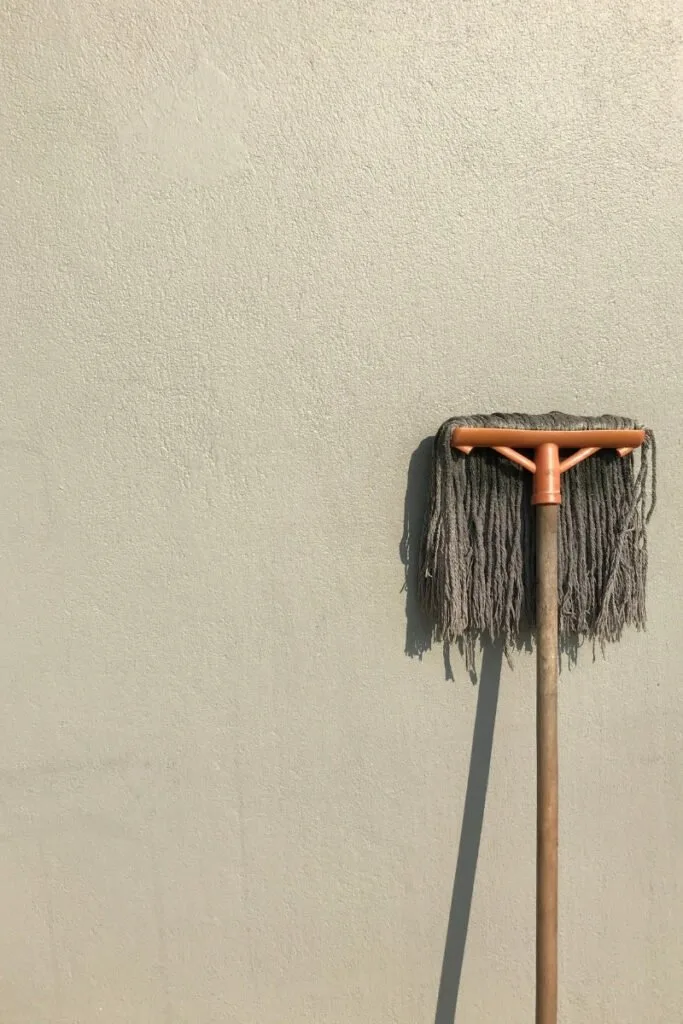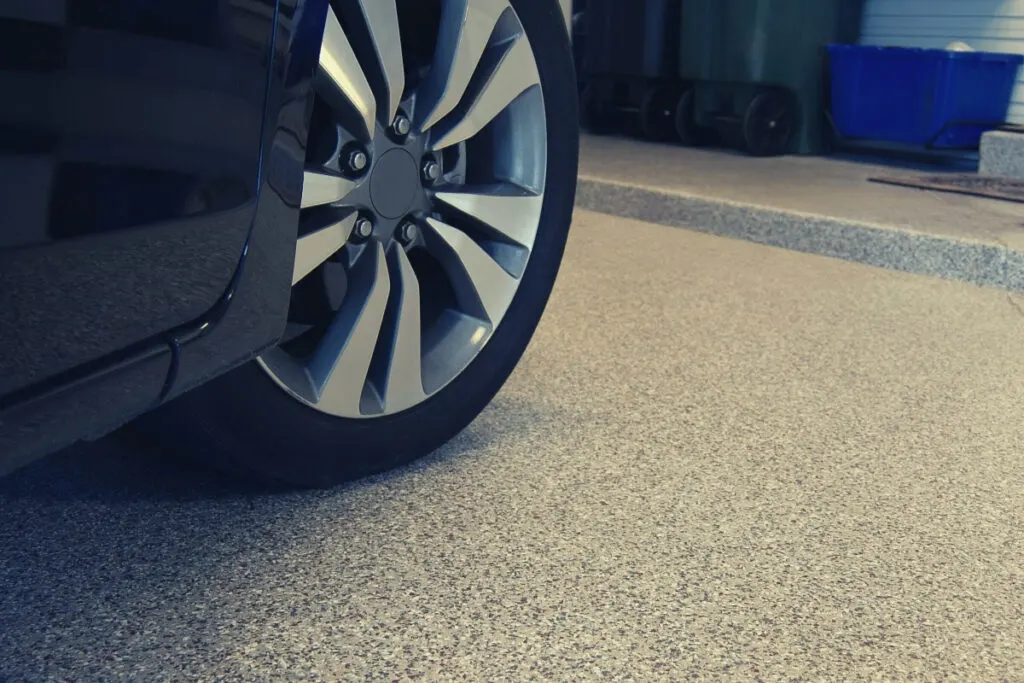From a New Year’s resolution to a simple excuse to get a break from Aunt Mae who’s overstayed her welcome after Christmas, there’s no time like the present to clean those garage floors. No two garage floor surfaces are the same, however, and neither is there one single way to get them clean. We’ll begin with a step-by-step guide to cleaning garage floors, with some added tips listed at the end, depending on the surface of the floor you have and the nature of the stains you’re addressing.
How to Clean Garage Floors: Step by Step
For best results, follow this simple guideline when cleaning the floor of your garage:
- Clear and sweep the space. Prep work is important for any garage cleaning project. Clean out the area of all lawn equipment, bikes, and general bric-a-brac. Once all the large objects are out of the way, sweep thoroughly, clearing out all the cobwebs, dust, grass clippings, and pet hair before you begin. We recommend keeping the garage door open throughout this process for ventilation and for the rinsing step, which we’ll explain more about a bit later on.
- Mix cleaner with warm water. Once your garage floor is clear of stuff and clean of miscellaneous debris, mix warm water with a driveway cleaner, or even just baking soda, or dish soap. Whatever you choose, make sure it meets U.S. EPA’s Direct Release criteria, meaning it will be as safe as possible for soil, streams, and to rinse into municipal waterways, among other natural areas.
Then, carefully pour the solution on the floor in small amounts. Following that, start scrubbing the floor with a hard-bristle brush. It’s best to tackle one small section at a time, and just like when mopping anywhere, start away from the door and work toward the door — that way you won’t get trapped!
- Soak and rinse. After scrubbing the floor, let it soak for up to seven minutes but don’t let the mixture dry completely. After that, rinse the floor slowly with a garden hose (here’s why it’s important to have the garage door open) working your way toward the door, and moving toward the street, or the outside of the garage.
And repeat this process until your floor is bright ‘n’ shiny as you like it to be.
Once clean, it can be helpful to seal or coat the floor of your garage with paint, concrete sealant, or epoxy. If your garage floor is already coated with a substance like this, there are some things to consider for future cleanings. From concrete to epoxy floors, here are a few additional things to be aware of before your cleaning project begins.
How To Clean Concrete Garage Floor: Bucket and a Mop

Similar to any kind of garage floor, when it comes to cleaning a concrete garage floor, much can be accomplished simply with a bucket and a mop. For a cleaning solution, some dish soap and warm water will most often suffice. For extra strength, consider adding baking soda, or mixing baking soda with some detergent to paste-like consistency. This can then be scrubbed into the stain.
Otherwise, if you’re faced with some especially tricky spots on your concrete garage floor, here’s what to do:
- Oil and grease stains. From cars to lawnmowers, oil and grease stains on your concrete garage floor are bound to happen. In instances like these, we recommend sprinkling a little kitty litter or sawdust on the spot. Then let it sit for about 24 hours before sweeping it up. Be sure to follow oil disposal protocols.
Once the cat litter or sawdust is swept up properly, drizzle a little laundry detergent or dish soap on the area and let that sit for about an hour. Following that, scrub at the stain with a brush soft enough so as not to scratch the surface of the concrete, or instead, try a power jet wand. Degreaser may be necessary for especially stubborn stains, and older spots may require repeated scrubbing for best results.
- Rust stains. To clean rust stains on your concrete garage floor, follow a very similar process to what was outlined above, with a few crucial differences. Instead of kitty litter or sawdust, spritz a good amount of lemon juice on the rust spot. Then let it sit for about 10 minutes prior to scrubbing. In an instance like this, a paste-like mixture of baking soda and detergent might also do the trick. Just don’t let it get too dry.
- Paint. Dripping paint is likely in any number of garage-based projects. If you’re looking to remove paint from a concrete floor without chemicals, here’s what we recommend. First, use a putty knife or some kind of scraping tool to carefully clear away loose or flakey paint. Then sweep up the debris. For especially stubborn spots, TSP (trisodium phosphate) cleaner is a simple and safe solution. Borax may also do the trick. If you choose to use some paint stripper, be sure to wear gloves and make sure your garage is ventilated.
How To Clean Epoxy Garage Floor: No Harsh Chemicals

Although epoxy floors are generally tough, they will show wear and tear over time and they can be susceptible to staining. If your garage has an epoxy floor, here’s how to keep it clean while also maintaining that nice epoxy shine.
- Clean frequently. The first step in cleaning your epoxy garage floor is regular maintenance, cleaning up dirt, dust, and debris before it builds up. A shop vacuum with a soft brush attachment is often more than adequate for the task. If you do spill on your epoxy floor, clean it up immediately.
- Avoid soap. Soap is rarely necessary when it does come time to mop or scrub your epoxy garage floor: warm water and a mop should more than do it. For a tougher spot, it’s alright to use some soap. Make sure it’s soft, or that it includes potassium hydroxide as an ingredient. This makes it easier on epoxy floors than other sodium-based products.
- Badly-stained floors and chemical spills. When addressed quickly, most stains come up easily from an epoxy garage floor with just a mop and some warm, soapy water. For big stains or badly soiled epoxy floors, some scrubbing may be required. Avoid using a scrubber like steel wool or harsh chemicals — a clear ammonia and water mix is also often effective.
It’s also important to quickly clean up gas, oil, paint, or chemical spills — preserving both the epoxy on your floor, and for safety reasons. While doing so, be sure to also follow all household chemical disposal guidelines.
How to Clean Garage Floors: a Clean Sweep
Garages are the place for messy projects, but once in a while, it’s also important to clean those floors. But what’s the best way to do it? In this article, we provide several pointers and guidelines for cleaning the average floor, such as the following:
- Clear and sweep the space.
- Mix cleaner with warm water and scrub or mop
- Rinse and repeat!
Common cleaners include:
- Dish soap or detergent
- Driveway cleaner
- Baking soda
There are some things to be aware of when cleaning concrete floors, or garage floors sealed with epoxy. For the most part though, these simple steps will get your garage floor clean and sparkling like new!
